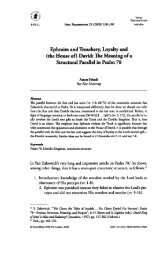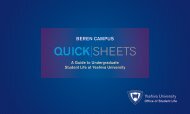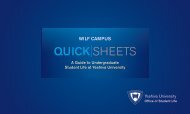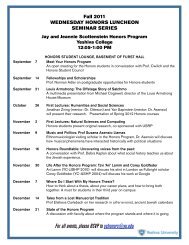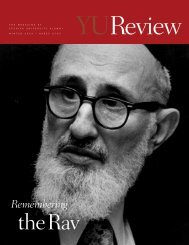Richard Steiner, Kol Nidre - Yeshiva University Blogs
Richard Steiner, Kol Nidre - Yeshiva University Blogs
Richard Steiner, Kol Nidre - Yeshiva University Blogs
Create successful ePaper yourself
Turn your PDF publications into a flip-book with our unique Google optimized e-Paper software.
<strong>Kol</strong> <strong>Nidre</strong>: Past, Present and Future35מה שנשבעתי כבר וכשהוא במ"ם במקום א"לף והיא נקודה בחירק116משמע מה שאני עתיד לישבע.As for what he (= R. Jacob b. Asher) writes: “He (=די Rabbenu Tam) also instituted the practice of sayingis the (די נדירנא ודמישתבענא =) This ”.נדירנא ודמישתבענאcorrect reading (in Ṭur Oraḥ Ḥayyim §619), 117 and that isbecause when it says נְ דָ רְ נָא one—דִּ word, dalet with ḥireq,nun with shewa, dalet with qametz [sic!])—it means “thatדִּ י which I [sic!] have already vowed,” but when it saysnun ,נָדִ ירְ נָא the other ,דִּ י two—נָדִ words, one of them ירְ נָאwithout shewa, dalet with ḥireq—it means “that which Ishall vow.” Similarly, when it says with—ודאישתבענאmedial aleph—it means “that which I (sic!) have alreadysworn,” but when it has mem instead of aleph and it isvocalized with ḥireq (under the bet), it means “that which Ishall swear.”The form נדירנא would ordinarily be interpreted as a passive form.Passive participles take a yod, because, unlike active participles, theyhave a long ḥireq, and long ḥireq is not affected by final resh. Thus,(פָּ טַ רְ נָא =) פטרנא I“ forbid” and (אָסַ רְ נָא =) אסרנא the active participles“I exempt” contrast with the passive participles סִ ירְ נָא (= אסירנא (אֲ “Iam forbidden” and טִ ירְ נָא (= פטירנא (פְּ “I am exempt(ed).” In otherwords, the addition of yod to נדרנא normally converts it to the passivevoice—a voice that makes no sense in our context. 118 Nevertheless, itmay be going too far to brand נדירנא as a misspelling when it is usedin the active voice. It can be compared to the active form פטירנא “I116.R Joseph Caro, בית יוסף in אורח חיים הוא הטור האחד ז ך ובהיר (Venice,1550), 398c §619. I am indebted to Dr. Bruce Nielsen, Center for AdvancedJewish Studies, <strong>University</strong> of Pennsylvania, for providing photographs of thispassage.117Contrast the readings found in the two earliest editions of Ṭur Oraḥדנדרנא ודאשתבענא ;(614§ ,1475 (Pieve di Sacco די נדרנא ודי מישתבענא Ḥayyim:(Mantua 1476, §603). I am indebted to Leah Adler and Rachel Berliner forproviding a photograph of the latter. For the former, see n. 83 above.118Cf. also the fictitious form נדירנא cited instead of נדינא “I amexcommunicated” (Ned. 7a) in printed editions of various halakhic worksn. 50); it too would be a passive לז p. 1: ,מסכת נדרים עם שינויי נוסחאות)participle if it were genuine.http://www.biu.ac.il/JS/JSIJ/12-2013/<strong>Steiner</strong>.pdf



